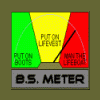-
Posts
416 -
Joined
-
Last visited
-
Days Won
4
Content Type
Profiles
Articles
Forums
Gallery
Downloads
Store
Everything posted by P_Instructor
-
Let the games begin...new paramedic class...let's see...military guy, shy gal, stubborn guy, a 'dude', a know it all, someone I don't know how to classify...oh well, sounds like the typical patient(s) you would see in a street shift......
-
Crap, got scheduled for a 24 hour shift in the flippin hot and humid weather. Stock the ice packs....
-
Crap....broke my arm.....







